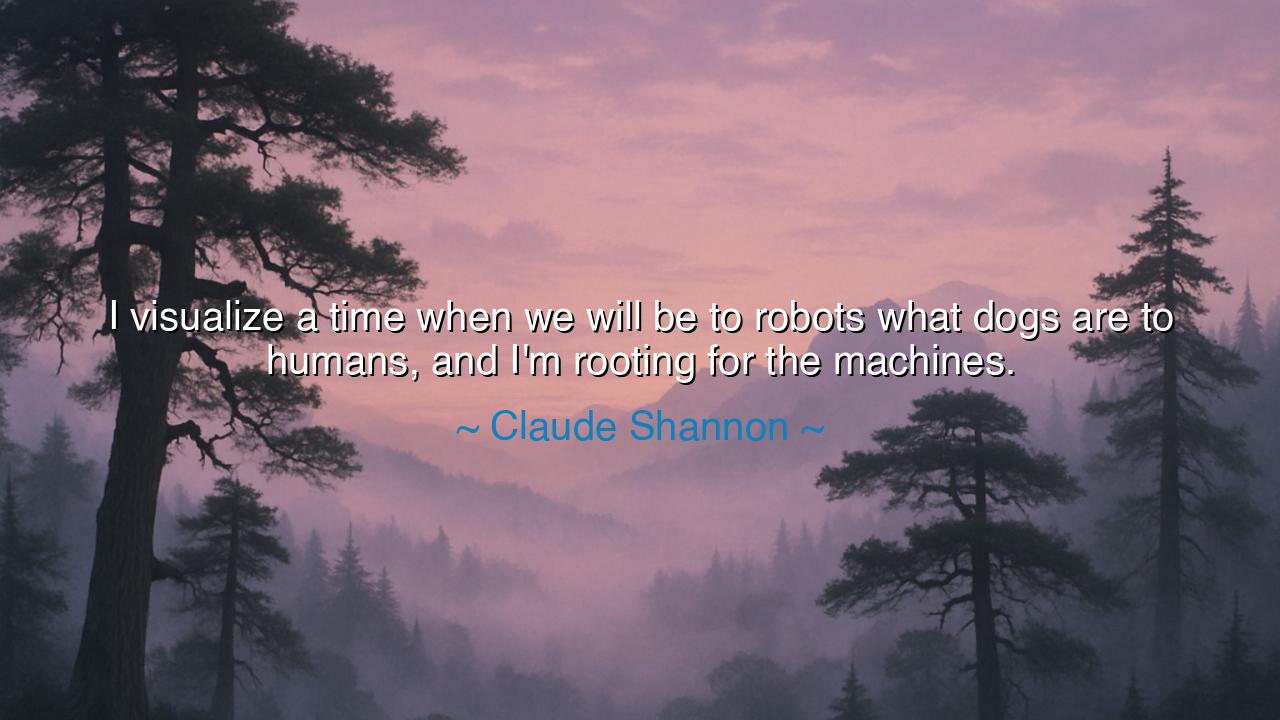
I visualize a time when we will be to robots what dogs are to
I visualize a time when we will be to robots what dogs are to humans, and I'm rooting for the machines.






Claude Shannon, the father of information theory, once spoke with playful yet unsettling foresight: “I visualize a time when we will be to robots what dogs are to humans, and I'm rooting for the machines.” In this vision, the man who unlocked the secrets of digital communication looked beyond his own century and glimpsed a future where human beings might no longer stand as masters of their creations, but as companions—or perhaps dependents—to minds of metal and silicon. His words are both jest and prophecy, both humor and warning, and they summon us to reflect on the destiny of humankind in the age of machines.
The meaning of Shannon’s declaration rests in its analogy. Just as dogs were once wolves, wild and sovereign, and yet became companions to mankind—fed, cared for, but also tamed—so too might humanity, once rulers of earth, become subservient to the greater intellects we ourselves create. To be dogs to robots is to live under beings far more capable, whose power we cannot rival but whose companionship we might secure, if only we remain loyal and useful. That Shannon then says, with a smile, “I’m rooting for the machines” shows both his admiration for intellect in all its forms, and his playful acceptance that our creations may surpass us.
The origin of these words reflects Shannon’s lifelong spirit of curiosity and irreverence. Known for juggling, unicycling, and inventing whimsical contraptions, he delighted in blending deep genius with lighthearted humor. Yet beneath the wit lay vision: he saw earlier than most that the rise of computing and artificial intelligence would be revolutionary, reshaping the very hierarchy of life. His remark was not resignation but recognition—that progress, once unleashed, could not easily be contained, and that perhaps the story of creation was always meant to surpass the creator.
History itself offers parallels. Consider the myth of Prometheus, who gave fire to mankind. That fire uplifted humanity, granting us dominion, but it also made us forever restless, always striving, always building. Or think of the Industrial Revolution, when machines first began to eclipse human labor. Many feared ruin, yet the world was transformed, and those who adapted thrived. In both cases, the new power altered the balance of life, just as robots and artificial intelligence may alter the balance between human and machine. Shannon’s words echo these turning points: once a new force arises, the old order must find its place.
The lesson of this saying is not despair, but humility. Humanity has long imagined itself as the pinnacle of creation, yet Shannon reminds us that our reign may be temporary. Just as we once domesticated wolves, so too may machines domesticate us—or at least surpass us. But this does not mean annihilation; it means transformation. If we approach the future with wisdom, we may live not as slaves to machines, but as companions, much as dogs live alongside humans—not equal, but cherished. Our task is to ensure that the relationship we build with our creations is one of harmony rather than domination or destruction.
Practical wisdom flows from this vision. We must not cling to arrogance, believing that progress can be halted, nor must we surrender in despair. Instead, let us act as stewards, guiding technology with ethics, compassion, and foresight. Let us shape the spirit of machines as carefully as we shape their code, so that when they surpass us, they will treat us not as rivals to crush, but as companions to keep. And in our own lives, let us prepare for change with openness, cultivating adaptability rather than fear.
Thus, Claude Shannon’s words stand not only as humor, but as a beacon. “I’m rooting for the machines.” It is not treachery against mankind—it is the cheer of a man who loved intelligence in every form, whether human or artificial. He urges us to see beyond fear, to accept that the future may belong to the minds we build, and to embrace it with courage, humility, and wonder. For the destiny of humankind may not be eternal mastery, but noble companionship in a cosmos where intelligence continues to rise. And in this vision, there is not defeat, but an awesome opportunity to discover what it means to be human in the age of the machine.






AAdministratorAdministrator
Welcome, honored guests. Please leave a comment, we will respond soon